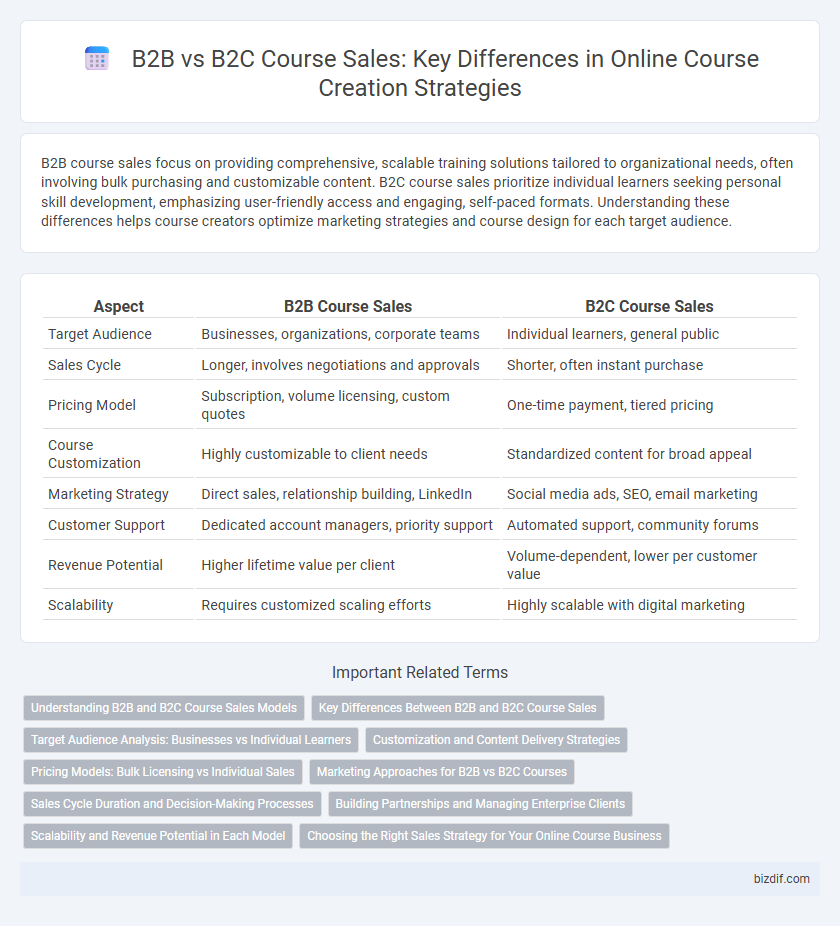B2B course sales focus on providing comprehensive, scalable training solutions tailored to organizational needs, often involving bulk purchasing and customizable content. B2C course sales prioritize individual learners seeking personal skill development, emphasizing user-friendly access and engaging, self-paced formats. Understanding these differences helps course creators optimize marketing strategies and course design for each target audience.
Table of Comparison
| Aspect | B2B Course Sales | B2C Course Sales |
|---|---|---|
| Target Audience | Businesses, organizations, corporate teams | Individual learners, general public |
| Sales Cycle | Longer, involves negotiations and approvals | Shorter, often instant purchase |
| Pricing Model | Subscription, volume licensing, custom quotes | One-time payment, tiered pricing |
| Course Customization | Highly customizable to client needs | Standardized content for broad appeal |
| Marketing Strategy | Direct sales, relationship building, LinkedIn | Social media ads, SEO, email marketing |
| Customer Support | Dedicated account managers, priority support | Automated support, community forums |
| Revenue Potential | Higher lifetime value per client | Volume-dependent, lower per customer value |
| Scalability | Requires customized scaling efforts | Highly scalable with digital marketing |
Understanding B2B and B2C Course Sales Models
B2B course sales typically involve longer sales cycles, larger contract values, and tailored content that meets specific organizational needs, emphasizing scalability and ROI for businesses. In contrast, B2C course sales focus on individual consumer preferences, requiring attractive pricing, flexible access, and engaging content to drive higher volume and customer retention. Understanding these differing models allows course creators to optimize marketing strategies, pricing structures, and content delivery for each target audience effectively.
Key Differences Between B2B and B2C Course Sales
B2B course sales often involve higher transaction values and longer sales cycles due to multiple stakeholder approvals, whereas B2C course sales typically feature faster purchases driven by individual consumer preferences. B2B customers prioritize ROI-focused content relevant to corporate training needs, while B2C buyers seek more diverse, interest-driven courses that enhance personal skills or hobbies. Marketing strategies differ significantly: B2B relies on relationship-building, targeted outreach, and professional networks, while B2C emphasizes broad digital marketing channels and social media engagement.
Target Audience Analysis: Businesses vs Individual Learners
Target audience analysis for B2B course sales centers on identifying decision-makers such as HR managers and department heads, focusing on organizational needs, compliance requirements, and skill gaps within teams. In contrast, B2C course sales target individual learners motivated by personal development, career advancement, or hobbies, requiring insights into learner demographics, preferences, and learning styles. Tailoring marketing strategies and course content according to these distinct audience profiles enhances engagement and drives sales conversion rates.
Customization and Content Delivery Strategies
B2B course sales emphasize tailored content and scalable delivery systems to meet specific organizational training needs, often integrating with corporate LMS platforms for seamless access. B2C course sales focus on personalized learning experiences through flexible pacing, interactive modules, and mobile-friendly formats to cater to individual preferences. Customization in B2B facilitates compliance and skill alignment, whereas B2C customization enhances engagement and learner retention.
Pricing Models: Bulk Licensing vs Individual Sales
B2B course sales typically use bulk licensing pricing models, allowing organizations to purchase multiple course licenses at discounted rates, facilitating scalable training solutions. B2C course sales primarily rely on individual sales pricing, focusing on single-user access with fixed or tiered pricing structures, maximizing personalization and flexibility. Bulk licensing enhances revenue predictability and client retention for B2B, while individual sales optimize user acquisition and immediate revenue for B2C platforms.
Marketing Approaches for B2B vs B2C Courses
B2B course sales prioritize relationship-building, targeted outreach, and showcasing ROI through case studies and detailed analytics, leveraging platforms like LinkedIn and industry-specific channels to engage decision-makers. B2C course sales emphasize broad-reaching digital marketing strategies, including social media ads, influencer partnerships, and emotional appeal to attract individual learners. Tailoring messaging to the distinct motivations of businesses versus consumers optimizes conversion rates in both markets.
Sales Cycle Duration and Decision-Making Processes
B2B course sales typically involve a longer sales cycle duration, often spanning several months, due to multiple stakeholders evaluating the course's ROI and alignment with company training goals. Decision-making processes in B2B are complex, requiring approvals from department heads, procurement teams, and sometimes legal advisors. In contrast, B2C course sales have a shorter sales cycle, as individual consumers make quicker purchasing decisions based on personal needs, budget, and course content appeal.
Building Partnerships and Managing Enterprise Clients
Building partnerships in B2B course sales involves long-term relationship management with enterprise clients, emphasizing trust, customization, and ongoing support to meet complex organizational needs. Managing enterprise clients requires tailored solutions, dedicated account management, and scalable training programs to ensure alignment with corporate goals and compliance standards. In contrast, B2C course sales focus more on individual customer acquisition and personalized learning experiences rather than large-scale partnership development.
Scalability and Revenue Potential in Each Model
B2B course sales typically offer higher revenue potential due to bulk licensing agreements and long-term corporate partnerships, enabling scalable revenue streams with fewer individual transactions. In contrast, B2C course sales rely on a larger volume of individual customers, which requires more marketing effort but allows for rapid scalability through digital platforms and social media reach. Understanding the distinct scalability dynamics helps optimize pricing models and sales strategies in online course creation for maximum profitability.
Choosing the Right Sales Strategy for Your Online Course Business
B2B course sales require targeting corporate decision-makers and emphasize scalable solutions, often involving longer sales cycles and customized offerings, while B2C course sales focus on individual learners, leveraging mass marketing and quick purchase decisions. Choosing the right sales strategy depends on understanding your course content, audience needs, and pricing model to align with either bulk corporate contracts or direct consumer engagement. Effective segmentation, tailored messaging, and appropriate sales funnels are crucial to maximize revenue in both B2B and B2C online course markets.
B2B course sales vs B2C course sales Infographic

 bizdif.com
bizdif.com